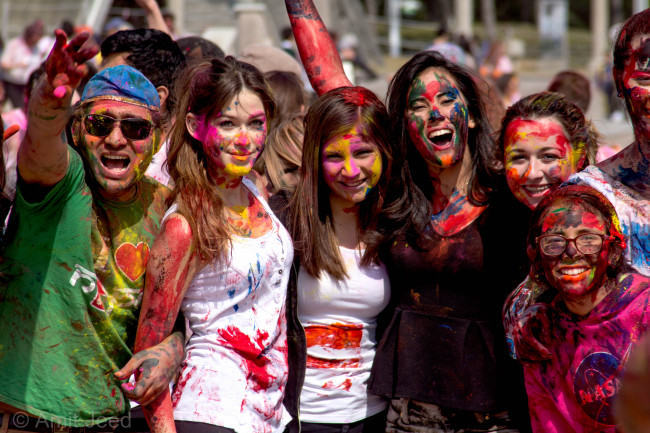Busan’s Haeundae Beach is set to become awash with color as the Holi Hai festival runs for the sixth time on April 3.
Holi, a spring festival that formally falls on March 23, is one of India’s most popular festivals, and the Busan celebration is now one of the biggest multicultural festivals in Korea. Organizer Amit Gupta said it was the largest event organized by a foreign community here, according to data from the Busan Foundation for International Activities, the city’s support center for expats.
He said the festival in India had a lot of diversity, as did its Busan cousin.
“Foreigners from all over the world travel to India to be part of this festival. Similar to the diversity of India, the Holi festival celebration also differs from one region to another in India,” said Gupta.
“However, the use of colors is common to all the celebrations and it is something that defines this festival.”
 |
People take part in last year’s Holi Hai festival in Busan (Amit Gupta) |
Gupta said that water guns, water balloons, and some games and performances were also common during Holi celebrations in India, but he said time, health and safety constraints meant that it wasn’t possible to organize them for the Busan event.
The festival is organized by Indians in Korea, a group founded in 2011 and separate from a Seoul-based group of the same name.
Gupta said that IIK expected 3,000 people for this year’s festival, which has been getting bigger every year.
“We try to bring some extra flavor every time, from delicious Indian delicacies to dazzling Bollywood music,” he said.
“Previously, we had the color throwing countdown at the beginning of the festival, however this year we are going to have an hourly countdown so there will be more colors to have fun with and to get colored yourself in rainbow editions.”
Gupta said the response he got from holding the festival was tremendous, and was thinking about expanding it.
“We are currently considering organizing similar events in other parts of Korea or to make it a biannual event,” though he said things were still at an early stage and nothing concrete had been arranged.
Despite being Korea’s second largest city, Busan has a fairly small Indian population of just a few hundred people, although nearby Geojedo Island has one of the largest Indian communities in Korea.
But Gupta said the festival attracted people from across Korea, and last year they counted more than 40 nationalities involved.
“There are Indians living in different locations of Korea and we receive their participation as well as foreigners from across the country,” he said.
“We started the festival in Busan as two of us organizers were living in Busan during that time. All these years Busan City has been very supportive to us, and since, unlike Seoul, this city doesn’t get a chance to organize many multicultural events, we would like to continue holding Holi festival here in Busan.”
Reservations for the festival are ongoing through its official website, www.holihai.org. Buses to the festival are being run, though availability of tickets is not guaranteed.
By Paul Kerry (
paulkerry@heraldcorp.com)








